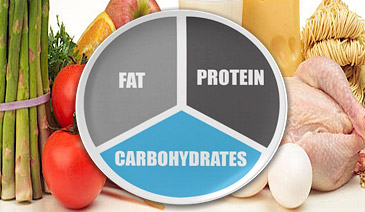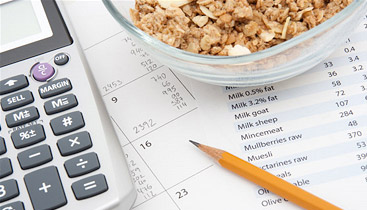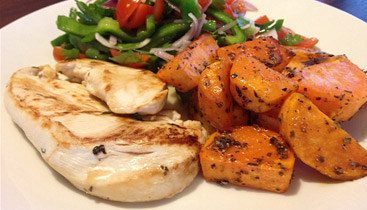BEST BULKING DIET TO BUILD MUSCLE? (THE SIMPLE TRUTH)

Effective muscle building nutrition can be made complicated.
Very complicated.
We can bounce around from article to article and video to video getting every expert’s opinion on what the best muscle building foods are…
How to precisely configure our macronutrient ratios in order to maximize results…
What the optimal meal frequency is to fully elevate protein synthesis…
Specific pre and post workout meals to boost training performance and recovery…
And everything in between.
Because of the endless sea of nutritional information available these days (with viewpoints ranging all over the map) most lifters are under the impression that structuring a proper bulking diet is some infinitely complex, hugely detailed process that must be carefully monitored at every waking hour of the day.
The reality?
For the average lifter out there, the dietary factors that you actually need to focus on in order to gain muscle effectively are pretty simple and straightforward.
In fact, it’s only a couple of fairly basic things that will ultimately make up the majority of your bottom line results, with the other smaller details only accounting for a few additional percent of extra gains.
Yes, if you’re a more advanced lifter with several years of training under your belt and are looking to squeeze out every ounce of muscle growth you can, then paying attention to those smaller details obviously makes sense.
However, for most regular gym-goers out there who just want to build a great physique without dedicating their entire lives to their bodybuilding program, dietary micro-management simply isn’t necessary.
In fact, getting too caught up in the details will likely be counterproductive since it will create additional unnecessary stress that will actually decrease the chances that you’ll stick to your bulking diet long term.
So, What IS The Best Bulking Diet For The Average Lifter?

Although there are a couple of other factors that come into play (which I’ll go over shortly) the best bulking diet in most cases is very simply this:
A reasonably balanced, minimally processed whole food diet that meets your total calorie needs for the day.
Beyond any specific “muscle building foods”, macronutrient ratios, meal frequencies or meal timing strategies… that’s pretty much it.
In fact, I’d go as far as to say this…
As long as you’re consuming a balanced mix of high quality protein, carbohydrates and fats throughout the day and are hitting your overall calorie target for muscle growth with decent accuracy, you’re already doing 90%+ of what you need to in order to maximize your muscle gains.
It’s not that calories are the only thing that matters. You of course need to be consuming sufficient protein each day in order to build muscle optimally, as well as sufficient fat to ensure that testosterone levels remain in the ideal range.
However, as long as you’re eating a relatively balanced diet and are not going out of your way to restrict any particular macronutrient, you’ll usually end up hitting your minimum requirements for each one without even really trying.
This is because:
A) If your primary goal is to gain muscle, you’ll be eating in a calorie surplus. This significantly lowers your “margin for error” since your food intake will be higher and under eating on any particular macronutrient will be a lot less likely.
B) You really don’t need a huge amount of protein or fat to build muscle effectively in the first place. 0.8 grams of protein per pound of body weight daily will likely be enough to optimize protein synthesis, and about 25% of total calories coming from fat will be adequate to keep testosterone levels elevated.
“But What About My Specific Macronutrient Ratio?”

Although you’ll hear all sorts of guidelines outlining what the best bulking macros are for gaining muscle, the truth is that exact protein/carb/fat distribution isn’t something the average lifter needs to precisely track as long as protein and fat minimums are being met.
Whether a higher percentage of your calorie surplus is being derived from carbohydrates or fats, the body will naturally adapt to the type of fuel it receives and body fat gains won’t be affected either way.
For that reason, going a bit higher carb and a bit lower fat, or a bit lower carb and a bit higher fat probably isn’t going to have any noticeable impact on your bottom line results as long as the total calorie content is equal.
The same goes for a diet that is a bit higher protein and bit a lower carb/fat, or a bit higher carb/fat and a bit lower protein. Again, as long as the total calories for the day are on point and you’re hitting your protein and fat minimums, it’s not really worth worrying about beyond that.
For this reason, tracking exact macros on a bulking diet is probably not necessary for most trainees, and gravitating toward a more intuitive style of eating will be the better long term approach.
You’ll end up with the same overall muscle building results, but without the additional hassle of having to specifically track every single gram of protein, carbs and fat that goes into your mouth.
Some tracking is obviously necessary if you’re serious about achieving the best results, but in terms of concrete numbers, monitoring your total calories and then just roughly estimating your macros should be plenty.
In a cutting phase things are a bit different since you have fewer total calories to work with and meeting your protein and fat minimums requires a bit more focused effort.
However, if your main goal is to pack on size and you’re eating in a calorie surplus, the macro numbers will usually just take care of themselves on their own.
You’ll of course want to double check that this is the case, but once you can be reasonably assured that your standard daily eating plan is hitting those protein/fat minimums, specifically tracking them gram for gram won’t be needed.
How Many Calories Should You Eat Per Day To Build Muscle?

Although tracking exact macros on a bulking diet is typically unnecessary, the importance of total daily calories should not be overlooked.
If you’re simply “eating on the fly” without any idea of where your calorie intake stands, there’s a very good chance that your results will be compromised or possibly even eliminated altogether.
If you don’t consume enough total calories throughout the week then you won’t be gaining muscle at your full potential, and if you consume too many calories then you’ll end up putting on an excessive amount of body fat throughout the process.
The key is to find your individual calorie “sweet spot” where muscle growth is maximized but where body fat gains are kept to a minimum.
Some people (especially those with good genetics) can often just eat based on hunger and see good results that way, but for the average lifter who is serious about this for the long haul, I’d highly recommend tracking your calories with decent accuracy at least in the beginning stages.
This will help you “learn the ropes” by teaching you which foods contain what, along with your personal calorie needs for bulking/cutting/maintenance and how you respond at varying intakes.
Although no calorie calculator is perfect, here’s a simple way to get an estimated starting point for yourself…
First off, calculate your calorie maintenance level.
This is the number of calories you require each day in order to maintain your current body weight.
This takes into account your BMR (basal metabolic rate, or the number of calories burned at rest) in addition to your activity level.
To find this number, multiply your body weight in pounds by one of the following activity level figures…
Sedentary = Bodyweight X 14
Lightly Active = Bodyweight X 14.5
Moderately Active = Bodyweight X 15
Very Active = Bodyweight X 15.5
Extremely Active = Bodyweight X 16
Take into account your training frequency, job, as well as additional activities you perform outside of the gym when making your selection. If you’re unsure here, just go with the middle ground figure of 15.
Next, create a small calorie surplus to support muscle growth.
How high above your maintenance level you eat should depend on your overall training experience, since the longer you’ve been training the fewer total calories your body will be able to divert to building new muscle.
Here’s an approximate guideline you can follow:
Beginners: Add 300 calories to your maintenance level.
Intermediates: Add 200 calories to your maintenance level.
Advanced: Add 100 calories to your maintenance level.
Use this caloric figure as your estimated starting point, and then adjust up or down depending on how quickly or slowly the gains are coming.
Beginners should aim to gain approximately half a pound per week (3 pounds per month at the absolute maximum), with the rate of muscle growth slowing down by roughly 50% for every year of proper training thereafter.
Also keep in mind that this caloric calculation assumes you’re beginning your bulking phase at no higher than about 12-14% body fat.
If you’re much higher than this then the calculation will over-estimate your needs, not to mention that you shouldn’t be committing to a bulk until you’ve reached this level of leanness first anyway.
Once you have your daily calorie intake figured out, double check that your protein and fat minimums are being met, and from there, simply lay out your daily food intake in whatever way is most enjoyable and convenient for you.
Though 2 meals per day will still produce significant results, I’d ideally recommend splitting this up into at least 3 separate protein feedings in order to maximize protein synthesis.
The Best Bulking Diet For Muscle Growth: The Bottom Line

Structuring an effective bulking diet is NOT rocket science, and obsessing over every little detail will likely just burn you out without delivering any significant additional results anyway.
As long as you’re consistently meeting your daily calorie needs for muscle growth and are consuming sufficient protein/fat from a mostly unprocessed whole food diet, you’ve already solved the vast majority of the nutrition equation right there.
If you’re a more advanced lifter who is approaching their genetic potential and wants to take their gains to the highest possible level, then sure, there are smaller details you can fine-tune to get yourself there.
However, for the typical lifter out there who wants to build an impressively lean and muscular body without revolving their life around their eating plan, keeping things simple and focusing on the core fundamentals is going to be a much more effective and sustainable long term approach.
If you found this article helpful, make sure to sign up for your FREE custom fitness plan below...




